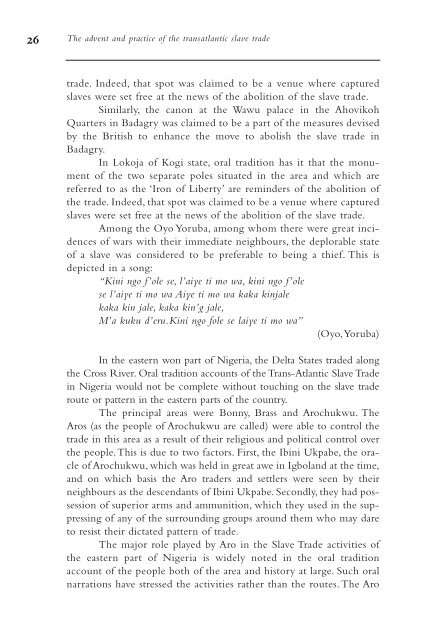Oral tradition relating to slavery and slave trade in Nigeria, Ghana ...
Oral tradition relating to slavery and slave trade in Nigeria, Ghana ...
Oral tradition relating to slavery and slave trade in Nigeria, Ghana ...
You also want an ePaper? Increase the reach of your titles
YUMPU automatically turns print PDFs into web optimized ePapers that Google loves.
26<br />
The advent <strong>and</strong> practice of the transatlantic <strong>slave</strong> <strong>trade</strong><br />
<strong>trade</strong>. Indeed, that spot was claimed <strong>to</strong> be a venue where captured<br />
<strong>slave</strong>s were set free at the news of the abolition of the <strong>slave</strong> <strong>trade</strong>.<br />
Similarly, the canon at the Wawu palace <strong>in</strong> the Ahovikoh<br />
Quarters <strong>in</strong> Badagry was claimed <strong>to</strong> be a part of the measures devised<br />
by the British <strong>to</strong> enhance the move <strong>to</strong> abolish the <strong>slave</strong> <strong>trade</strong> <strong>in</strong><br />
Badagry.<br />
In Lokoja of Kogi state, oral <strong>tradition</strong> has it that the monument<br />
of the two separate poles situated <strong>in</strong> the area <strong>and</strong> which are<br />
referred <strong>to</strong> as the ‘Iron of Liberty’ are rem<strong>in</strong>ders of the abolition of<br />
the <strong>trade</strong>. Indeed, that spot was claimed <strong>to</strong> be a venue where captured<br />
<strong>slave</strong>s were set free at the news of the abolition of the <strong>slave</strong> <strong>trade</strong>.<br />
Among the Oyo Yoruba, among whom there were great <strong>in</strong>cidences<br />
of wars with their immediate neighbours, the deplorable state<br />
of a <strong>slave</strong> was considered <strong>to</strong> be preferable <strong>to</strong> be<strong>in</strong>g a thief. This is<br />
depicted <strong>in</strong> a song:<br />
“K<strong>in</strong>i ngo f’ole se, l’aiye ti mo wa, k<strong>in</strong>i ngo f’ole<br />
se l’aiye ti mo wa Aiye ti mo wa kaka k<strong>in</strong>jale<br />
kaka k<strong>in</strong> jale, kaka k<strong>in</strong>’g jale,<br />
M’a kuku d’eru.K<strong>in</strong>i ngo fole se laiye ti mo wa”<br />
(Oyo,Yoruba)<br />
In the eastern won part of <strong>Nigeria</strong>, the Delta States <strong>trade</strong>d along<br />
the Cross River. <strong>Oral</strong> <strong>tradition</strong> accounts of the Trans-Atlantic Slave Trade<br />
<strong>in</strong> <strong>Nigeria</strong> would not be complete without <strong>to</strong>uch<strong>in</strong>g on the <strong>slave</strong> <strong>trade</strong><br />
route or pattern <strong>in</strong> the eastern parts of the country.<br />
The pr<strong>in</strong>cipal areas were Bonny, Brass <strong>and</strong> Arochukwu. The<br />
Aros (as the people of Arochukwu are called) were able <strong>to</strong> control the<br />
<strong>trade</strong> <strong>in</strong> this area as a result of their religious <strong>and</strong> political control over<br />
the people.This is due <strong>to</strong> two fac<strong>to</strong>rs. First, the Ib<strong>in</strong>i Ukpabe, the oracle<br />
of Arochukwu, which was held <strong>in</strong> great awe <strong>in</strong> Igbol<strong>and</strong> at the time,<br />
<strong>and</strong> on which basis the Aro <strong>trade</strong>rs <strong>and</strong> settlers were seen by their<br />
neighbours as the descendants of Ib<strong>in</strong>i Ukpabe. Secondly, they had possession<br />
of superior arms <strong>and</strong> ammunition, which they used <strong>in</strong> the suppress<strong>in</strong>g<br />
of any of the surround<strong>in</strong>g groups around them who may dare<br />
<strong>to</strong> resist their dictated pattern of <strong>trade</strong>.<br />
The major role played by Aro <strong>in</strong> the Slave Trade activities of<br />
the eastern part of <strong>Nigeria</strong> is widely noted <strong>in</strong> the oral <strong>tradition</strong><br />
account of the people both of the area <strong>and</strong> his<strong>to</strong>ry at large. Such oral<br />
narrations have stressed the activities rather than the routes.The Aro


